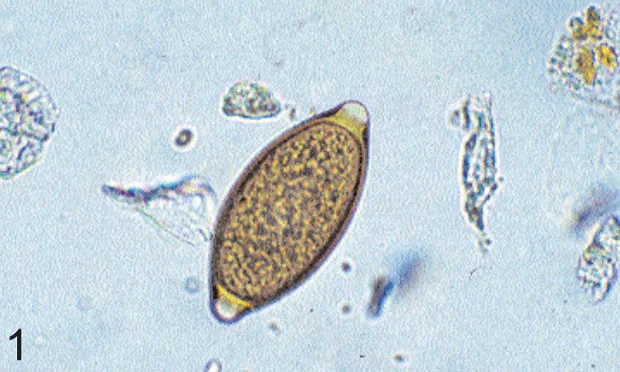
An intact male beagle, approximately 2 years of age, was presented for evaluation of diarrhea.
History. The dog was first presented 2 months previously after being picked up by the owner from a roadside. At that time, the dog was in moderate body condition and the owner reported intermittent diarrhea with tenesmus for several weeks. The feces were foul-smelling with excess mucus and occasional frank blood. A fecal flotation examination done at the time of the initial visit detected a small number of Ancylostoma caninum eggs. An ivermectin/pyrantel heartworm preventative was dispensed for monthly administration. At the current visit, the owner reported that the intermittent diarrhea had continued.
Physical Examination. The dog was alert and responsive. Conjunctival and oral mucous membranes were judged to be slightly pale.
Laboratory Work. Routine hematologic and blood chemistry values were analyzed. The abnormal findings are shown in the box.
A fecal sample provided by the owner was examined using a centrifugal flotation procedure. A small number of helminth eggs was detected (Figure 1).
Diagnosis. Chronic whipworm infection.
Whipworm, Trichuris vulpis, is a common parasitic infection of the canine large intestine in the United States. Although infection is subclinical in many dogs, heavy worm burdens or increased host susceptibility can lead to large bowel diarrhea, as reported in this patient. Chronic disease may also be accompanied by anemia, hypoproteinemia, and eosinophilia.

Trichuris infection is diagnosed by finding eggs on fecal flotation. The large, brown, football-shaped eggs have polar plugs (Figure 2, black arrow) and a clear-brown, unstriated shell (Figure 2, red arrow). However, several other helminths also produce football-shaped eggs with polar plugs. Trichuris has the largest (approximately 70 to 90 µm in length), brownest, and most common eggs of these parasites, but whipworm eggs must be distinguished from those of capillarid parasites of the respiratory system, Eucoleus (Capillaria) aerophila and Eucoleus (Capillaria) boehmi.

Capillarid eggs tend to be more yellow in color, have a striated shell, and may have offset polar plugs (i.e., those that are not directly opposite one another). Capillarid eggs are also generally smaller (approximately 55 to 75 µm in length) than those of Trichuris. Eggs of the bladderworm, Pearsonema (Capillaria) plica, are also similar and can be seen in fecal samples contaminated with urine. In Figure 3, a Trichuris egg (black arrow) can be compared with a capillarid egg (red arrow) and an Isospora oocyst (blue arrow).
Prognosis. The heartworm preventative dispensed at the first visit eliminated the dog's Ancylostoma infection but did not remove existing whipworms. Trichuris infection can be treated with a single oral administration of a febantel/pyrantel/praziquantel combination product (25 mg/kg, 5 mg/kg, and 5 mg/kg, respectively) or milbemycin (0.5 mg/kg). Fenbendazole (50 mg/kg orally Q 24 H for 3 days) is also effective for treatment of whipworm infection. Because the parasite has a long prepatent period of approximately 12 weeks, treatment should be repeated at monthly intervals for 3 months. Trichuris eggs require at least 2 weeks in the environment to become infective, thus fecal removal is an essential component of control. Whipworm transmission can take place in any season when a dog licks its feet or grooms its coat after being on contaminated soil.
ASK YOURSELF. . .
• Is the description of diarrhea provided by the owner on the first visit typical of Ancylostoma caninum infection?• Is there any advantage to centrifuging a fecal flotation preparation over letting the flotation occur in a tube sitting on the benchtop?• Since the eggs shown in Figure 1 were absent on the first fecal examination, can you conclude that the infection was not present at that time?
DID YOU ANSWER. . .
No. Diarrheic feces typically associated with hookworm disease have a dark, tarry appearance caused by blood loss in the small intestine associated with parasite feeding. In contrast, the foul-smelling mucoid diarrhea with frank blood is found with Trichuris, a large bowel parasite.
Yes. Centrifugation of fecal flotation preparations enhances recovery of parasite eggs. A study conducted at Virginia Tech showed that in tests using 33% zinc sulfate flotation solution, centrifugation isolated Trichuris eggs in a significantly larger number of samples than did benchtop flotation.1
No. Trichuris infections may be difficult to diagnose because of the long prepatent period and intermittent egg production. As a general rule, three fecal samples collected over the course of at least 7 days should be examined to rule out whipworm infection.
Diagnostic Testing
Variable Result Reference Range*Total protein (g/dl) 4.5 5.0-7.0Red blood cells 4.9 5.22-8.9(x 106/µl)Eosinophils 3 0.1-1.25(x 103/µl)Packed cell volume (%) 28 36-58
*Normal values used in the Veterinary Teaching Hospital, Virginia-Maryland Regional College of Veterinary Medicine